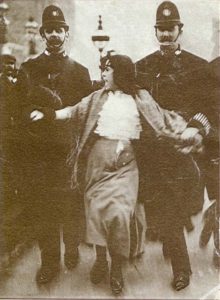Dora Thewlis was born in 1890. She was one of seven children of a working-class family in Huddersfield, West Yorkshire. Her parents were proud of her curiosity and integrity. Her mother Eliza described her in glowing terms: “Ever since [Dora] was seven, she has been a diligent reader of newspapers and can hold her own in politics.” At age ten, Dora worked part-time at the local mill, spending the rest of her day at school. In her teens, Dora joined the Women’s Social and Political Union, an organisation campaigning for women’s right to vote.
In 1907, Dora travelled to London to take part in a political march. She and a group of other suffragettes were arrested for attempting to rush the House of Commons. Dora’s defiance and spirit captured the public’s imagination. A photo of her arrest appeared in newspapers and on postcards, often labelling her “the Baby Suffragette.” Dora’s story shows how parts of somebody’s identity (like their class, gender and age) can influence their treatment before the law and in the media.
The magistrate who heard Dora’s case could not believe that her parents had “let her loose” in London. He also implied that Dora’s main reason for going to London was to “entice” men. The magistrate had trouble imagining why a teenage girl would be interested in voting rights, or why her parents would allow her to travel and campaign un-chaperoned. He didn’t acknowledge that the issues Dora was campaigning for affected her personally. Still, even while Dora spent a week in prison, her parents encouraged her. Dora’s mother Eliza wrote to her daughter: “I am very proud of the way you have acted, so keep your spirits up and be cheerful.”
Dora objected to being called “the Baby Suffragette.” When approached by a journalist, she declared, “I am not a baby. In May next year I shall be eighteen. Surely for a girl, that is a good age?” This part of Dora’s story shows one of the major challenges of being a girl in many societies. Growing up, I was expected to obey adults but also to provide care to others. I often felt like adults chose to see me as a child or a grown-up depending on what was convenient. This combination of sexism and ageism works to downplay girls’ achievements and their power. However, Dora’s story shows that when girls are treated as intelligent and independent, they can be courageous activists.
-Emily Chandler
Junior Girl
Girl Museum Inc.

